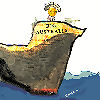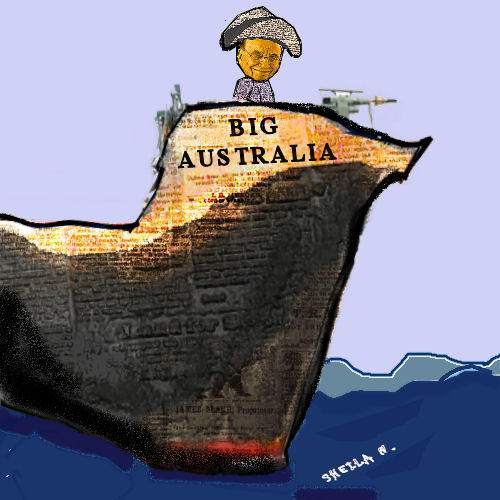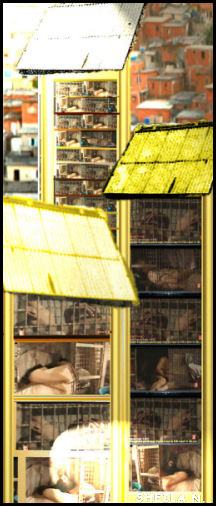Australia, Can we stop an elected dictatorship by Multimedia?
 According to some of Australia's most widely published journalists and many opinion polls, the Liberal and National Parties were thrown out of office largely because of voter objections to their policies, notably their anti-union "Work Choices" laws.
According to some of Australia's most widely published journalists and many opinion polls, the Liberal and National Parties were thrown out of office largely because of voter objections to their policies, notably their anti-union "Work Choices" laws.
Despite this, less than three years since Australians repudiated the ruling Federal Liberal and National Parties' policies and laws, the same polls and commentators say that they may soon become the government again. There are issues behind the issues which the mainstream doesn't cover.

 According to some of Australia's most widely published journalists and many opinion polls, the Liberal and National Parties were thrown out of office largely because of voter objections to their policies, notably their anti-union "Work Choices" laws.
According to some of Australia's most widely published journalists and many opinion polls, the Liberal and National Parties were thrown out of office largely because of voter objections to their policies, notably their anti-union "Work Choices" laws.
Despite this, less than three years since Australians repudiated the ruling Federal Liberal and National Parties' policies and laws, the same pollsters and commentators say that they may soon become the government again. There are issues behind the issues which the mainstream doesn't cover.
According to some of Australia's most widely published journalists and many opinion polls, the Liberal and National Parties were thrown out of office largely because of voter objections to their policies, notably their anti-union "Work Choices"laws.
Despite this, less than three years since Australians repudiated the ruling Federal Liberal and National Parties' policies and laws, the same pollsters and commentators say that they may soon become the government again.
If media 'prediction' comes true, Labor will have turned into a one-term government party and the Liberal and National Coalition will have effectively become the natural parties of Government.
The mainstream media are like obedient cattle-dogs barking at the heels of the public, herding us en masse one way, then sending us wheeling in the opposite direction, yet somehow we always end up back in the same dull paddock with lousy feed and the same old farmer Brown.
Animal Farm
Julia Gillard has incurred the farmer's wrath because she has publicly rejected former Prime Minster Kevin Rudd's "Big Australia" policy to hugely swell Australia's population, mostly through immigration. The press have called her 'populist' (oddly, their greatest insult) , insinuated that she is racist, and trotted out article after article saying how terrible it would be if our population stopped growing. They have also tried to condemn her on the pretext of her allegedly ruthless deposing of Rudd. The unfavourable treatment of Gillard over this and other issues may be the reason why opinion polls and some widely published journalists are predicting that Labor is now more likely to lose than to win the election.
Manufactured media dramas overshadow major democratic and environmental issues
This swaying of an election by emphasisizing in a negative way such aspects of the campaign is an illustration of just how the media can unfairly decide the outcome of elections. Those, who have been persuaded to vote against Labor through exposure to this repeated narrowly focused media-disapproval, may not have based their decision on far more critical policy issues, including the need to strengthen and preserve democracy and our long-term sustainability as a civilised and prosperous society, which are both issues at stake. Mainstream media focus virtually ignores democracy and ecological sustainability.
Julia Gillard's ousting of Kevin Rudd could provide a way for the Labor Government to much better govern in the interests of ordinary Australians than under Kevin Rudd's leadership. Under Kevin Rudd's leadership, a lot of policies which were harmful to the interests of ordinary Australians and which had never obtained their informed support, were being imposed dictatorially. The most resented, we are learning as the population debate explodes, was Kevin Rudd's decision to unhealthily bloat Australia's population to suit some vested commercial interests. Successive recent governments,
including John Howard's, had been ramping up population growth, but Rudd opened up the throttle to a rate where the harm to existing Australians and the environment was plain for all to see.
Ruddbank and Building the Education Revolution
In addition, the Rudd Government was criticised for crudely implementing major programs of Government expenditure.
The most widely criticised of these crude schemes was in relation to the squandering of money on school infrastructure, which has been blamed on Julia Gillard, because she oversaw the grandiosely named $16.2 billion "Building the Education Revolution" scheme. The main basis of this criticism was that projects which could have delivered to many schools, simply through through repairs of or the extension of existing buildings, using local firms and labour, were scrapped in favour of arbitrarily selected new buildings delivered by large, remote construction companies.
This program should really have been criticised within a larger policy, as a mutation of Rudd and Swann's
Ruddbank bill, which was thrown out of Parliament at the last moment. Ruddbank was Rudd's first reaction to the global financial crisis. He saw banks pulling out of financing more property development, and thus the pins being pulled from under the construction and development bubble which Australia has been dangerously reliant on now for years. Rudd and Swann rose to power from humble political beginnings in 1986 when they worked in Wayne Goss's office in Queensland. There they traded ALP investments until they had built a huge ALP self-financing tradition on land-speculation and finance largely in property, banking, and insurance. Rudd and Swann are wed to that kind of economy; so was the ALP under them. Those financial attachments have driven laws in parliament to privilege development and infrastructure finance with public money, and to exclude democratic rights to oppose unwanted development.
If the mainstream media hates Gillard so much, can she be all that bad?
It is hard to believe that Gillard's government will not remain bound by those financial ties, however the fact that Gillard has piped up about not being a big population person makes her government unusual. Many of us wonder if she is sincere and if she is able to deliver democratically on this.
Perhaps the biggest indicator that she may be able to is that the mainstream media are so consistently opposed to her. Going by their disapproval of her population statements this is because they truly believe she may cut down on population growth and the huge immigration program they have been responsible for marketing on behalf of the corporate sector and their own corporate investments.
Indeed, her object may actually be less a democratic one than to avoid incurring more public debt through more taxpayer funding of shortfalls in infrastructure finance at a time when no private institution wants to invest in infrastructure expansion. She may be responding to ALP corporate advice that the so-called Global Financial Crisis is only just beginning.
So, should we trust our instincts which tell us that to vote for the people the mainstream media most objects to, and therefore vote Gillard back in?
Would the Libs carry on Rudd's infrastructure investment policies and exploit Labor's bad state laws?
On the other hand, What would happen if the Liberal National Coalition regained majority in Federal Parliament?
The question this article raises is, could we be better off with a Liberal government? Or would a Liberal government simply do the same thing as the Labor governments, relying on the suppression of democracy at law which has been accomplished at parliamentary level by Labor State Governments in their efforts to promote infrastructure expansion in tandem with international immigration?
To our knowledge, the only Liberal opposition which has actually criticised the way that Labor has gone about financing infrastructure expansion and population growth with tax-payer money and suppressing democratic objection by changing laws and abolishing local government power, has been the Queensland Liberal-National Party. See "John-Paul Langbroek and why the Liberal National Party won't survive unless Labor Governments reform." This article, whilst supporting Queensland Liberal-National Party leader, John-Paul Langbroek's condemnation of the structural corruption of government in Queensland, and proposing useful ways to combat this corruption, also acknowledges that it is perhaps only the Liberal-National Party's need to survive which drives these reform attempts. Despite these doubts, what else do we have to begin to deconstruct the diabolical machine that the Labor Party has constructed against democracy?
Langebroek's bills need to be repeated in every state and Federal parliament and supported by all parties. Yet we hear almost no discussion of them.
Role of Media and of Internet Censorship in Australian politics
The ability of the public to monitor what is going on and to act to make the government and opposition politicians represent them better lies in the quality of the mainstream media. Much hope in this regard lies in internet-based alternative media and our ability to harnass this for public benefit.
An important related issue is Gillard's decision to delay internet censorship and the Liberal Government's policy platform of cancelling it, with the support of the Greens.
Even though the Liberals opposition to mandatory internet filtering is a welcome development in Australian democracy, many voters will still have to weigh this against the likelihood that a re-elected liberal government will act similarly to the last Liberal government of which most current Liberal members of Parliament were members. That government behaved undemocratically and in many instances against the interests of most Australians, particularly poor Australians. The most striking example was its anti-union "Work Choices" legislation.
In fact the issue of mandatory internet filtering is bigger than just the question of censorship; it is really about government-monitoring and control over every Australian's behaviour on the internet and goes to the heart of intellectual and personal privacy. As James Sinnamon said, "If a government really wanted to outlaw child pornography over the internet, it would do much better to make it a criminal offense to consult certain sites, and publish the addresses of those sites and its reasons for outlawing them. In that way it could avoid the extraordinary financial, bureaucratic, hard and software outlay required to monitor every click made by 22 million plus Australians on the internet, whilst achieving the same objective."
This needs more discussion.


Recent comments